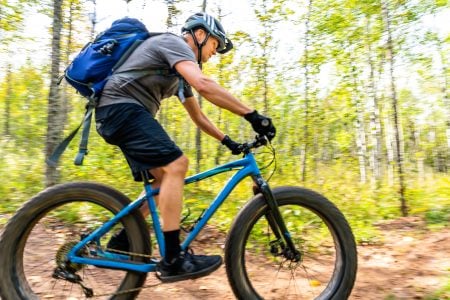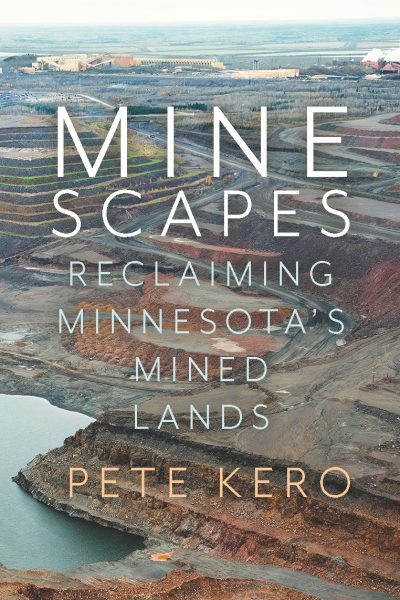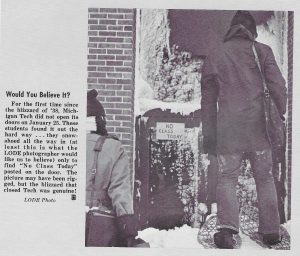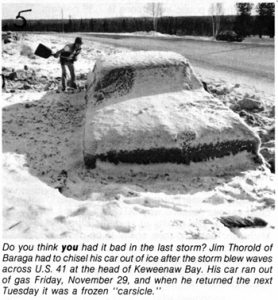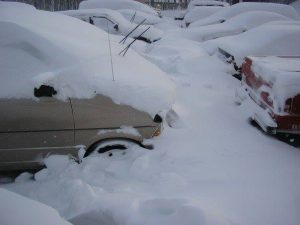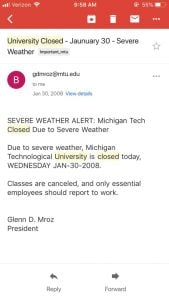Pete Kero is one of the first handful of Michigan Tech graduates in environmental engineering, earning his degree in 1994. He has spent 29 years doing environmental engineering consulting in the Upper Peninsula and northern Minnesota. Kero was the visionary behind the award-winning Redhead Mountain Bike Park in Minnesota which repurposed iron mining landscapes into recreational acreage.
Recently, he wrote his first book titled Minescapes: Reclaiming Minnesota’s Mined Lands, which was released by the Minnesota Historical Society Press in May 2023.
Following is a Q&A with Kero on his ties to Michigan Tech and book.
Where are you from and how did you decide to come to Tech?
I grew up in Negaunee, and the short road to Michigan Tech was a well-beaten path for my family. My dad was a mechanical engineering graduate. My brother-in-law earned a civil engineering degree. My sister is a chemical engineering grad. I also have uncles who went to Tech.
What did you study?
I was part of Tech’s second-ever environmental engineering class in 1994. We were housed largely in civil engineering (now known as the Department of Civil, Environmental, and Geospatial Engineering). The department has grown and grown since I was there. It was a great choice for me.
Were there any memorable professors or academic stories?
Alex Mayer was the advisor for my environmental engineering design team. He was so patient with us as a rag-tag group of students. He took us to Las Cruces, New Mexico for a competition. I remember dodging tornadoes on the drive down. It was a really memorable capstone experience, and I appreciated that opportunity.
Talk about activities outside class while you were at Michigan Tech.
I loved skiing on the Nordic trails and mountain biking, even though there were no formal trails at the time. We’d bike the back roads and skid roads of the Keweenaw. One great memory is that my roommate and I had a competition to see how many Mondays in a row we could keep swimming in Lake Superior once the school year started. We made it to the middle of November. The last week we did it, there were people wearing snowmobile suits fishing on the shore.
How has your career progressed?
I’ve spent 29 years in environmental consulting, working for public projects, mining, and manufacturing. I got my start working in the U.P. at Sundberg Carlson and Associates. I moved to Minnesota and worked for various companies before joining Barr Engineering. What I like about consulting is there’s a different challenge every day. I see unique problems that don’t already have a stock solution.
How did Michigan Tech prepare you for your career?
Tech was a great school to prepare you for the real world—both the ups and downs. Tech was pretty hard, but work can be pretty hard. Tech taught me how to push through challenges and how to work with people and systems.
Have you been involved with Tech as an alumnus?
I make it back to campus from time to time and stay in touch with several professors, some of whom are former colleagues at Barr. I always follow with interest what’s going on at Tech. As I was writing this book one of the post-doctoral students from Tech contributed to my understanding of early tailings management on the Mesabi Range.
What advice would you give to current Tech students?
Slow down and enjoy your time. I blasted through college in four years, but a little breathing room gives you some time to sink your teeth into more things. It helps you be able to approach and understand the materials much better.
What spurred you to write the book?
I was personally involved as a volunteer and professional in this vast mine-disturbed territory in northeast Minnesota. It’s around 140,000 acres that have been flipped like a pancake to provide the iron ore that has built this country. Our goal was to see if there was anything we could do to attract people to this area. I volunteered to help create the Redhead Mountain Bike Park. We had to overcome so many roadblocks, including changing state law and changing perceptions about why people would be attracted to these old mined landscapes. So from my time volunteering working on the project, I had lots of notes. I wanted to set the story straight on how the bike park came to be. In order to properly tell the story, you have to go back in time. It’s really a history book. It tells the story of not only the bike park, but five generations of mine reclamation and repurposing in the area, told in a nonfiction narrative.
What was the timeline and process for completing the book?
The book took four years. It started with a phone call to the Minnesota Historical Society Press. I expected to have them tell me no, but they encouraged me to propose the book and were fantastic to work with. Shannon Pennefeather helped me shape it, and many other people reviewed and edited the book. It was a journey that wasn’t easy, but it was gratifying.
What do you hope people take away from reading the book?
I hope they take away that there can be a full circular life to mine lands. The land can go through the creation of mine, active mining, and reclamation. It can be made valuable again through techniques that we used. Mining is a divisive topic, but just about everybody is in favor of mineland reclamation. It can be unifying and shine a spotlight on environmental operators and pioneers for this work.

